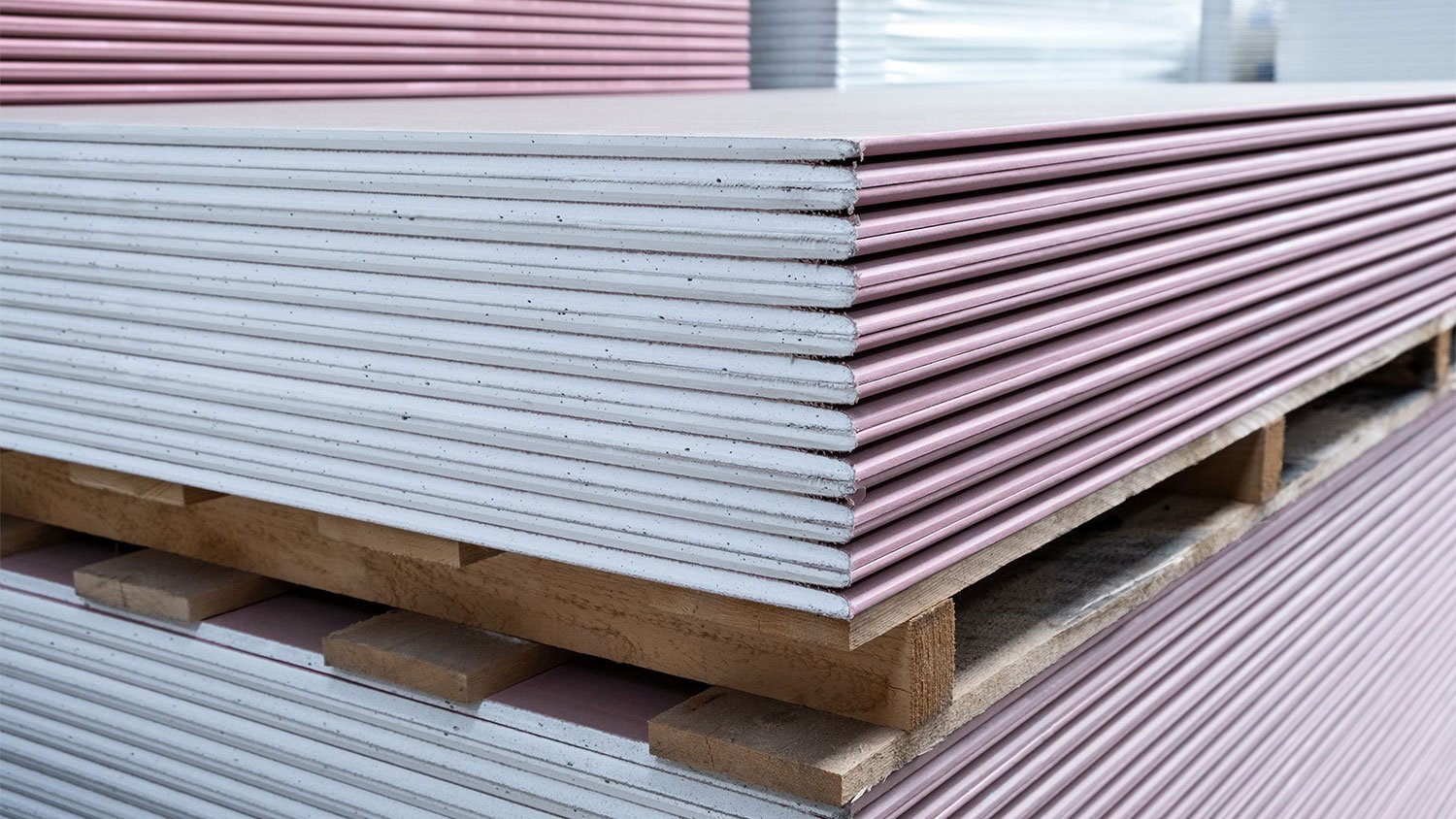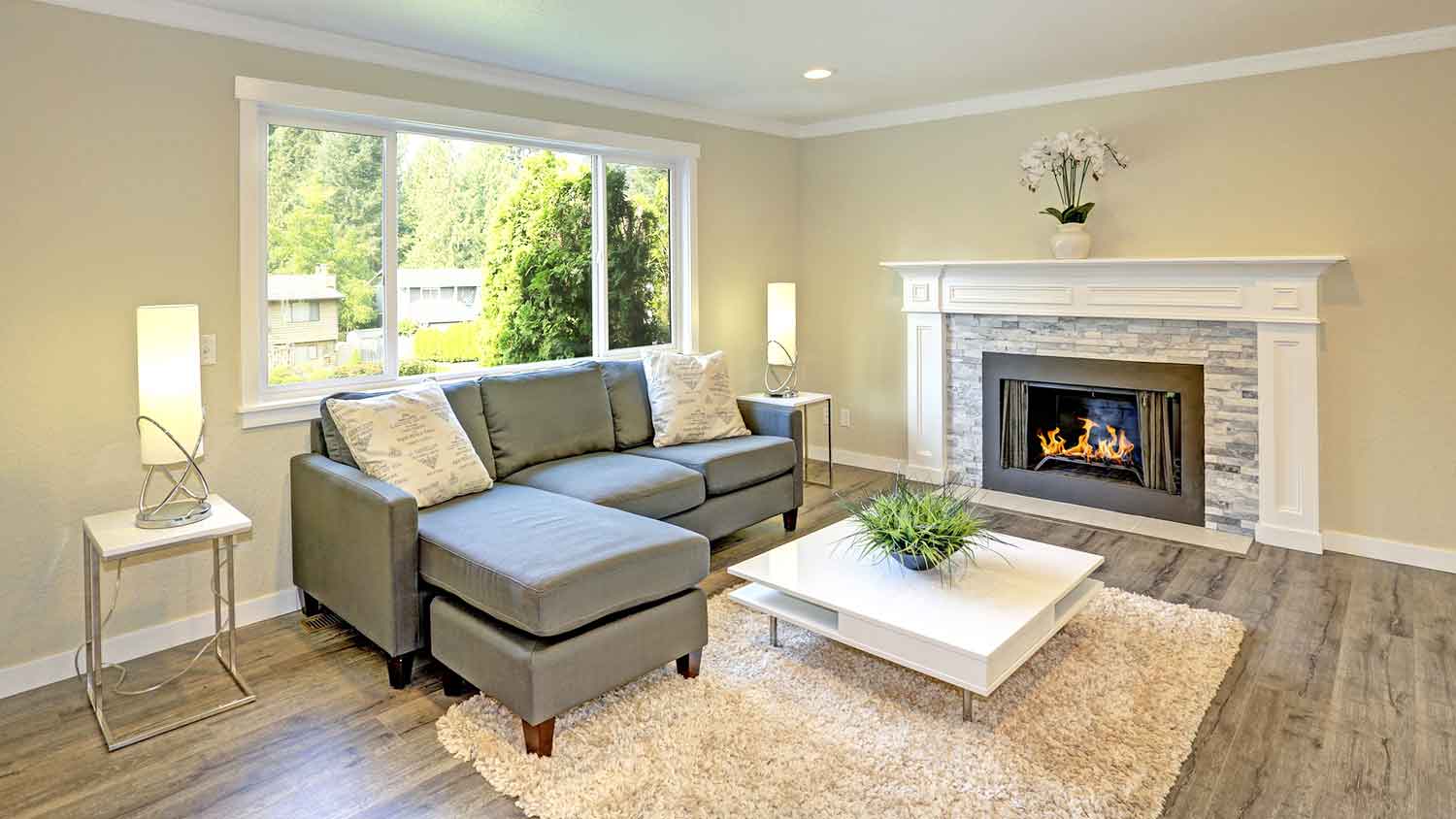
Pre-drywall inspection costs vary depending on the home size, build complexity, and reporting you receive. Estimate your budget with this cost guide.
Drywall fire rating requirements vary by room and location


All drywall contains fire-resistant materials.
Different types of drywall resist burning for different periods.
Type C fire-rated drywall can resist burning for up to four hours.
Fire-resistant drywall costs 50% more than regular drywall.
Proper installation can increase drywall’s fire-resistance.
If you’re building a home, considering house renovations, or just wondering if you’re properly protected in a worst-case scenario, you may be wondering if drywall is flammable. In short, all drywall is technically fire-resistant. However, not all drywall is created equal. In this guide, we’ll discuss drywall fire rating, which determines just how resistant your drywall will be to fire.
All drywall is fire-resistant to some degree, and the fire rating of your drywall is what determines how long the building material can be exposed to flames without catching fire. It’s important to note that even with the highest drywall fire rating, your walls are fire-resistant and not fire-proof. With enough exposure, all drywall will catch fire.
Standard drywall panels are made of a layer of a soft, non-flammable mineral called gypsum pressed between two thick sheets of paper. There is also water incorporated into the structure of the material, which effectively blocks the transfer of heat through the drywall.
When exposed to fire, drywall will not immediately ignite. The heat from the fire will begin to vaporize the water within, simultaneously charring the drywall and causing it to lose about half its strength and stiffness. When the water vapor has dissipated completely, the gypsum will begin to heat and the drywall may begin to burn.
Temperature does not affect the fire resistance of drywall. Instead, different types of drywall can resist burning for certain periods of time depending on their ability to maintain structural integrity. No drywall can stop the spread of fire completely, but knowing the differences between regular and fire-rated drywall can help you know which is best for your project.
| Drywall Type | Fire Resistance |
|---|---|
| Regular Drywall | Up to 1 hour |
| Type-X Drywall | Up to 2 hours |
| Type-C Drywall | Up to 4 hours |
The most commonly used type of drywall in home construction is regular drywall made of gypsum plaster. This variety serves as a base for interior paint application and comes in various thicknesses including ⅝ inch, ½ inch, ⅜ inch, ¼ inch, and ¾ inch panels. Half-inch panels, also called lightweight drywall, are the most common because they are easier to transport and handle.
Standard drywall, regardless of thickness, is able to resist burning for up to one hour.
| Pros | Cons |
|---|---|
| Cost-effective | Less fire resistant than Type C |
| Also resists mold and mildew | Difficult to install |
| Versatile |
Type X is one of two types of fire-rated drywall specifically manufactured with special additives to provide superior mold, mildew, and fire protection. Type X drywall is usually made from thin sheets that are ⅝ inches thick. The added thickness and moisture contained within the sheets help resist burning for up to two hours when applied in a single layer to both sides of standard wood framing in a house.
Type X drywall is around 30% more expensive than standard drywall, so the added fire protection you get for the increased drywall installation cost is worth it, depending on your situation.
| Pros | Cons |
|---|---|
| Offers the most fire resistance | Expensive |
| Easy to paint | Expensive |
| Meets strict building codes |
Type C drywall is also fire-rated and provides superior fire resistance compared to Type X. Depending on the project, Type C will resist burning for up to four hours. It also features a smooth surface that is very easy to paint.
Type C drywall is around 25% more expensive than Type X drywall, and about 100% more expensive than standard drywall. Once again, the added protection you get from fire—200% compared to Type X and 400% compared to standard drywall—might be well worth the investment.

Fire-resistant drywall offers several benefits over regular drywall. Properly installed, it is more effective at containing a fire and slowing its spread, as well as protecting structural supports long enough for occupants to flee a burning building safely. From a safety perspective, fire-resistant drywall is a worthwhile investment, especially for larger apartment buildings or complexes that house many occupants.
With that being said, most residential homes aren’t required to include fire-resistant drywall. In some cases, local building codes or regulations might require Type X or Type C drywall, but this is usually in small areas particularly prone to fire. These include the following:
Boiler rooms
Garages, especially if solar batteries or generators are present
Kitchens
If you’re hiring a drywall installer near you to put up new drywall, they should know if fire-rated drywall is mandatory in certain parts of your home.
As you might expect, the higher the drywall fire rating you need or want in a room, the more expensive it will be to install new drywall. The table below includes a quick look at average prices for a single 4x8-foot sheet of drywall based on the fire rating.
| Type of Drywall | Average Cost Per Sheet | Average Cost Per Sq. Ft. |
|---|---|---|
| Standard Drywall | $15 | $0.46 |
| Type X Drywall | $21 | $0.65 |
| Type C Drywall | $30 | $0.93 |
Standard drywall resists fire for up to an hour and usually costs around $15 per sheet. If you opt instead for Type X drywall, you get 200% of the fire resistance, and your cost only goes up around 30%.
Type C provides 400% of the fire resistance of standard drywall and 200% of Type X. It costs around 30% more than Type X and 100% more than standard drywall. Each step up in drywall fire rating provides more bang for your buck, but it’s important to note that Type X and Type C drywall usually isn’t worth it unless it’s required by code, or you’re installing drywall in a commercial building or apartment building for safety reasons.
The way drywall is installed can also affect its fire resistance. Once the drywall is attached to a home's wood or steel studs, there are small gaps between sheets through which air, smoke, and fire could pass. Drywall contractors will apply tape and joint compound to close these gaps, thereby improving the wall's overall fire resistance.
A contractor can also install drywall in multiple layers to increase fire resistance. Additional sheets of drywall provide better protection for the studs and insulation behind the walls, increasing the time between a fire starting and the wall collapsing from damage.
Your local drywall contractors should know your local and state standards and fire codes regarding the application and finishing of drywall for the safest installation possible.
We had a leak coming through our ceiling. We didn't know what to do. Joe came and repaired the leak right away. After. that he replaced the drywall that was damaged in the ceiling.
Rosman does a very good job with painting, drywall and mudding.
It was a complete nightmare. Took over 9 months, would not show up, workmanship is very shoddy, my windowsill is piecemeal and not mitered correctly, my stairs trim is horrendously trimmed out, I have drywall missing on top of my door frame, a plastic piece of my window was broken, they could...
Brad just finished a water damage area and ceiling crack job for me. I've tried three times over the years to do the ceiling crack job myself, never coming close to the results that Brad has. Brad is particularly helpful with explaining the products and processes he employs. You can...
Jason was awesome! Very professional and the drywall work that he did for us is excellent. Highly recommend this company.
I'd like to start by saying the categories for projects seem pretty narrow. I had Brent quote me on framing / drywalling in an open room to create a private area with a door more like a bedroom rather than just open to the world. Brent and Adam did great work while they were here, they...
Great attention to detail. Delivered on every promise and even did a little extra. Our home was not an easy job, two stories, extensive landscaping, some troubled/stained areas but he handled them all. One final word of advice, you get what you pay for. Don't always look for the cheapest bid....
Darrell is very good of doing his job, he tells me all the details of the house and what needs to get fix. His using some advance technology to inspect for molds in the back of the drywalls. Ill recomend him to everyone that is first time home buyer like me.
We did not hire this Pro, but not because of anything negative at all. Julian came out today and let me know that the drywall that we thought needed replaced did not need to be replaced. We appreciate the honesty!
From average costs to expert advice, get all the answers you need to get your job done.

Pre-drywall inspection costs vary depending on the home size, build complexity, and reporting you receive. Estimate your budget with this cost guide.

The cost to replace plaster with drywall can quickly add up. This guide will help you budget for this project and decide if it's worth the effort and cost.

Whether you’re trying to keep noise in or out, soundproofing materials are the way to go. Use this guide to see how much it costs to soundproof a room.

Discover the key differences between caulk versus spackle and learn when to use each for your home improvement projects. Get expert tips for a perfect finish.

Don’t forget about room corners in your plans for smooth, seamless walls. Learn how to drywall corners like a pro with this step-by-step guide.

Before you dive into a drywall project, you’ll need to know how many screws to use per sheet of drywall. This guide will help you calculate the total number.